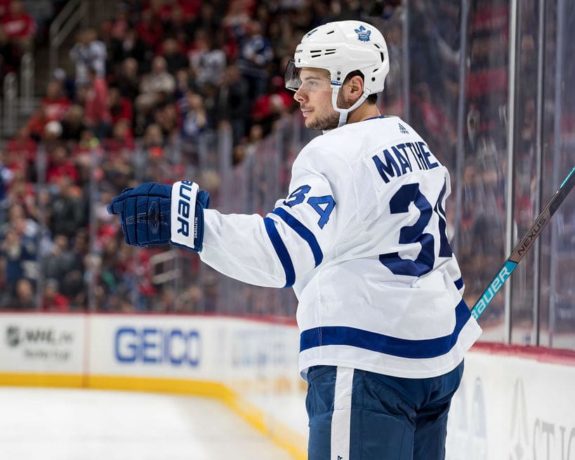As if there isn’t enough for the Toronto Maple Leafs to worry about after the team’s recent losing record, now Pierre McGuire is reported to have reminded Maple Leaf fans about the attraction of the team’s two pending restricted free agents Auston Matthews and Mitch Marner. McGuire noted: “If they don’t have those guys signed by a certain period of time, there will be offer sheets. There will be offer sheets.”
Where Do Things Stand with Marner & Matthews?
Matthews and Marner finish their entry-level contracts on July 1, 2019. Both young Maple Leaf stars will need to negotiate and sign new contracts. Then the fun begins; that is, if you thought William Nylander’s drama was fun. But, one thing McGuire suggests is accurate, if Matthews and Marner don’t sign with the Maple Leafs, they will certainly sign somewhere else. Neither seems ready for an early retirement.

Perhaps it will simply be pro forma, and Maple Leafs general manager Kyle Dubas and the agents of both stars will find easy agreements and the signings will one morning simply be announced to the public. But, I’m probably dreaming. Both players’ agents will no doubt seek high salaries for their charges, and Maple Leaf fans everywhere know there are salary-cap limits the team must abide by.
Here’s how it works. If neither signs with the Maple Leafs before the deadline, both Matthews and Marner will become “restricted free agents” (RFAs) in July. Whether one is a fan of RFAs or not, the concept of “restricted” free agency was put into place so that NHL players would not be low-balled on salary negotiations by the team they’re currently signed with.
Specifically in the Maple Leafs’ case, to make “restricted” work, other teams can send Matthews and Marner contract offers after July 1, 2019, but the Maple Leafs can match those offers and keep the players on the terms signed in those offers. Or, if the Maple Leafs let either player go, the team would receive a required number of draft picks from the team that signs them.

Because Matthews and Marner are highly-coveted players, they will likely fetch huge salaries. (Rumor has it that Matthews might be offered about $11 million per season.) As noted, if Matthews or Marner sign with another team, and the Maple Leafs do not match that offer, the other team must give up draft picks to the Maple Leafs.
Specifically, if either signs an offer between $6,728,781 and $8,410,976 per year, the team that signs Matthews or Marner must give up two first round picks, a second-round pick and a third-round pick. If either Matthews or Marner signs an offer over $8,410,976 and the Maple Leafs choose not to match it, the signing team must give up four first round picks.
Points For or Against Restricted Free Agency
If you are a fan who sides solidly with players’ rights, you are probably against restricted free agency as it stands because you believe the rule restricts free market decisions that could and, in truth, do limit players’ salaries. However, if you are a team-oriented fan, you probably like it that the balance currently tips towards players remaining with their “home” teams. Furthermore, you might correctly believe star NHL hockey players are far from being hard done by. In the real world, as most of us understand, we seldom can choose where we work. So, to us, the RFA concept seems reasonable.
In truth, the RFA rules are tipped toward teams. On the other hand, becoming an unrestricted free agent at the age of 27, which I will talk about later, is tipped toward players. That’s why there hasn’t been an offer sheet signed in seven years, since Ryan O’Reilly signed a two-year, $10-million deal with the Calgary Flames as a member of the 2012-13 Colorado Avalanche. The Avalanche matched.
Restricted free agency thus works in two ways in the case of Matthews and Marner. First, it protects these young players from getting ridiculously low offers from the Maple Leafs in relation to their fair market value. Second, it makes it easier for the Maple Leafs to hold on to these core players. To me, it seems like a win-win situation for both NHL players and teams, where both sides must give a bit. I’m thinking that in the case of Matthews and Marner, Maple Leaf fans should be pleased with the system.

Players who have been with their teams longer, such as John Tavares with the New York Islanders this past summer prior to signing with the Maple Leafs, can become “unrestricted free agents.” If a player’s contract expires, he may declare himself to be an unrestricted free agent if he’s over the age of 27 or has played in the league for at least seven years. Unrestricted free agents can sign with any team they choose, and their previous teams get nothing. Obviously, the rules were to Tavares’ advantage, and he went home to Toronto to play with the favorite team from his youth.
For this reason, the trade deadline becomes interesting for NHL fans. If your favorite team is likely to make the Stanley Cup Playoffs, they might become a “buyer” that trades for a player with an expiring contract if you believe that “rental” potentially aids your team’s Stanley Cup run. On the other hand, your favorite team might become a “seller” that trades a player with an expiring contract to a Stanley Cup contender for “something” in return, likely a prospect.
Related: Is It Time for the Maple Leafs to Trade Kadri?
Actually, this system has an elegance to it that makes keeping up with the NHL interesting during the dog days of the season. Looking far ahead, Matthews and Marner would be eligible to become unrestricted free agents on July 1, 2023. However, both would seem to be looking for longer-term contracts with the Maple Leafs, something in the range of six years. And, the Maple Leafs are probably pleased to sign that length of contract.
Where Are Matthews, Marner and the Maple Leafs?
Word is that Matthews’ agent is having conversations with Dubas, but they are “informal.” Marner’s camp has noted it will wait until after the season to engage in contract talks. For their part, Matthews and Marner don’t talk about their pending free agencies when they are together. As Matthews noted, “It’s not really something that comes up, I guess.”
He added: “If we do talk, it’s not really hockey-related, it’s really just anything … I don’t think it’s something that either of us stresses about too much in our minds. I just think we want to go out and play hockey and have fun. That’s why you have agents that take care of this stuff.” Good on them; they’re kids. Ridiculously rich kids, but kids.

Matthews and Marner are a huge part of whatever success the Maple Leafs have had this season. They will sign with the Maple Leafs for millions of dollars this summer. Perhaps the Arizona Coyotes will try to rise up and steal hometown boy Matthews, but I doubt it. No team extends an offer sheet to a player anymore, and I doubt the Coyotes or any other team will be audacious enough to break rank.
Related – Maple Leafs News: Nylander, Lamoriello, Matthews & Team MVP
Nor would either player likely be inclined to sign elsewhere. Instead, their agents will use the shadows and rumors that emerge from hockey pundits like McGuire to threaten and posture Dubas until both sides arrive at negotiated contracts. Then everyone will be happy. In this instance, I think the RFA system works for Maple Leaf fans.